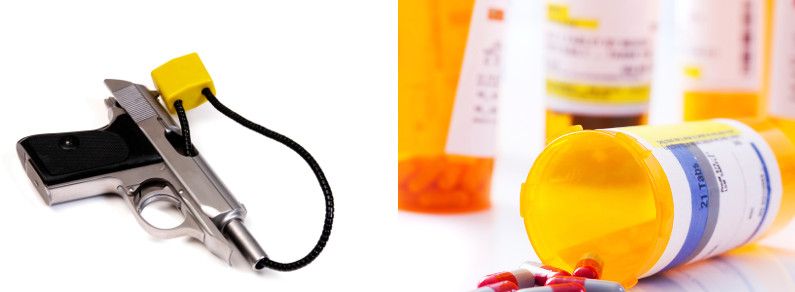Reduce Access to Means of Suicide

Reducing access to lethal means of self-harm for a person at risk of suicide is an important part of a comprehensive approach to suicide prevention. Firearms are the most lethal among suicide methods. Also of concern are medications that are lethal at high doses.
Why It’s Important
Here are some of the reasons why reducing access to lethal means is important:1
- Many suicide attempts take place during a short-term crisis, so it is important to consider a person’s access to lethal means during these periods of increased risk.
- Access to lethal means is a risk factor for suicide.
- Reducing access to lethal means saves lives.
What You Can Do
Families, organizations, health care providers, and policymakers can take many actions to reduce access to lethal means of self-harm. Some of these are general household health and safety precautions that should be used regardless of suicide risk. Examples include limiting access to medications and storing firearms safely when not in use.
Other actions may be more appropriate when a person is at risk for suicide. If someone in the home is feeling suicidal, has recently attempted suicide, or is experiencing a crisis, it is safest to remove lethal means from the household entirely until the situation improves. For example:
- Store firearms with law enforcement (if allowed), or lock up firearms and put the key in a safe deposit box or give the key to a friend until the crisis has passed.
- Ask a family member to store medications safely and dispense safe quantities as necessary.
Some communities also focus means restriction efforts on local suicide “hotspots,” such as bridges. As part of strategic planning, states, tribes, and communities should examine their data to identify what suicide means they should address.
Families, organizations, health care providers, and policymakers can take many actions to reduce access to lethal means of self-harm.
Take Action
Obtain and share knowledge about the issue and how others can help.
- Learn more about this topic by visiting the Means Matter website, maintained by the Harvard T. H. Chan School of Public Health.
- Educate family members and others about ways to limit access to lethal means during a suicidal crisis.
- Train mental health professionals in lethal means counseling. (See the free online course Counseling on Access to Lethal Means.)
- Train nontraditional providers in lethal means counseling, for example, divorce and defense attorneys, probation/parole officers, and first responders.
- Educate the community about options for temporary storage of a firearm outside of the home during a suicidal crisis.
Collaborate with others in your community to increase safety.
- Institute lethal means counseling policies in health and behavioral health care settings and train health care providers in these settings.
- Pass policies that exempt at-risk patients from mandatory 90-day refill policies.
- Work collaboratively with gun retailers and gun owner groups on suicide prevention efforts. (See Gun Shop Project for examples of materials developed with and for firearms retailers and range owners.)
- Distribute free or low-cost gun locks or gun safes.
- Ensure that bridges and high buildings have protective barriers.
Reference
- Harvard T. H. Chan School of Public Health. (n.d.). Means matter website. Retrieved from http://www.hsph.harvard.edu/means-matter
Recommended Resources

CALM: Counseling on Access to Lethal Means

